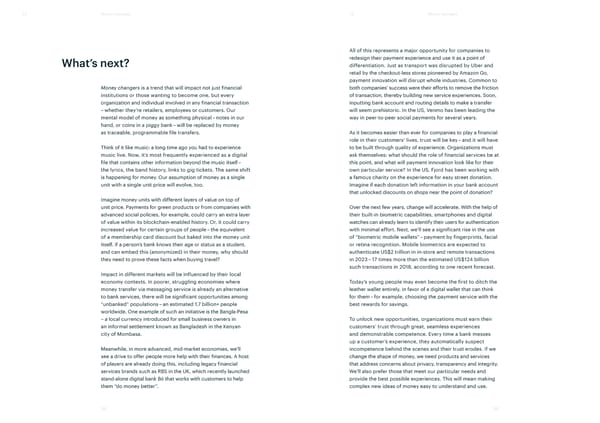T2 Money changers T2 Money changers All of this represents a major opportunity for companies to What’s next? redesign their payment experience and use it as a point of differentiation. Just as transport was disrupted by Uber and retail by the checkout-less stores pioneered by Amazon Go, payment innovation will disrupt whole industries. Common to Money changers is a trend that will impact not just financial both companies’ success were their efforts to remove the friction institutions or those wanting to become one, but every of transaction, thereby building new service experiences. Soon, organization and individual involved in any financial transaction inputting bank account and routing details to make a transfer – whether they’re retailers, employees or customers. Our will seem prehistoric. In the US, Venmo has been leading the mental model of money as something physical – notes in our way in peer-to-peer social payments for several years. hand, or coins in a piggy bank – will be replaced by money as traceable, programmable file transfers. As it becomes easier than ever for companies to play a financial role in their customers’ lives, trust will be key – and it will have Think of it like music: a long time ago you had to experience to be built through quality of experience. Organizations must music live. Now, it’s most frequently experienced as a digital ask themselves: what should the role of financial services be at file that contains other information beyond the music itself – this point, and what will payment innovation look like for their the lyrics, the band history, links to gig tickets. The same shift own particular service? In the US, Fjord has been working with is happening for money. Our assumption of money as a single a famous charity on the experience for easy street donation. unit with a single unit price will evolve, too. Imagine if each donation left information in your bank account that unlocked discounts on shops near the point of donation? Imagine money units with different layers of value on top of unit price. Payments for green products or from companies with Over the next few years, change will accelerate. With the help of advanced social policies, for example, could carry an extra layer their built-in biometric capabilities, smartphones and digital of value within its blockchain-enabled history. Or, it could carry watches can already learn to identify their users for authentication increased value for certain groups of people – the equivalent with minimal effort. Next, we’ll see a significant rise in the use of a membership card discount but baked into the money unit of “biometric mobile wallets” – payment by fingerprints, facial itself. If a person’s bank knows their age or status as a student, or retina recognition. Mobile biometrics are expected to and can embed this (anonymized) in their money, why should authenticate US$2 trillion in in-store and remote transactions they need to prove these facts when buying travel? in 2023 – 17 times more than the estimated US$124 billion such transactions in 2018, according to one recent forecast. Impact in different markets will be influenced by their local economy contexts. In poorer, struggling economies where Today’s young people may even become the first to ditch the money transfer via messaging service is already an alternative leather wallet entirely, in favor of a digital wallet that can think to bank services, there will be significant opportunities among for them – for example, choosing the payment service with the “unbanked” populations – an estimated 1.7 billion+ people best rewards for savings. worldwide. One example of such an initiative is the Bangla-Pesa – a local currency introduced for small business owners in To unlock new opportunities, organizations must earn their an informal settlement known as Bangladesh in the Kenyan customers’ trust through great, seamless experiences city of Mombasa. and demonstrable competence. Every time a bank messes up a customer’s experience, they automatically suspect Meanwhile, in more advanced, mid-market economies, we’ll incompetence behind the scenes and their trust erodes. If we see a drive to offer people more help with their finances. A host change the shape of money, we need products and services of players are already doing this, including legacy financial that address concerns about privacy, transparency and integrity. services brands such as RBS in the UK, which recently launched We’ll also prefer those that meet our particular needs and stand-alone digital bank Bó that works with customers to help provide the best possible experiences. This will mean making them “do money better”. complex new ideas of money easy to understand and use. 29 30
 xReport Page 16 Page 18
xReport Page 16 Page 18